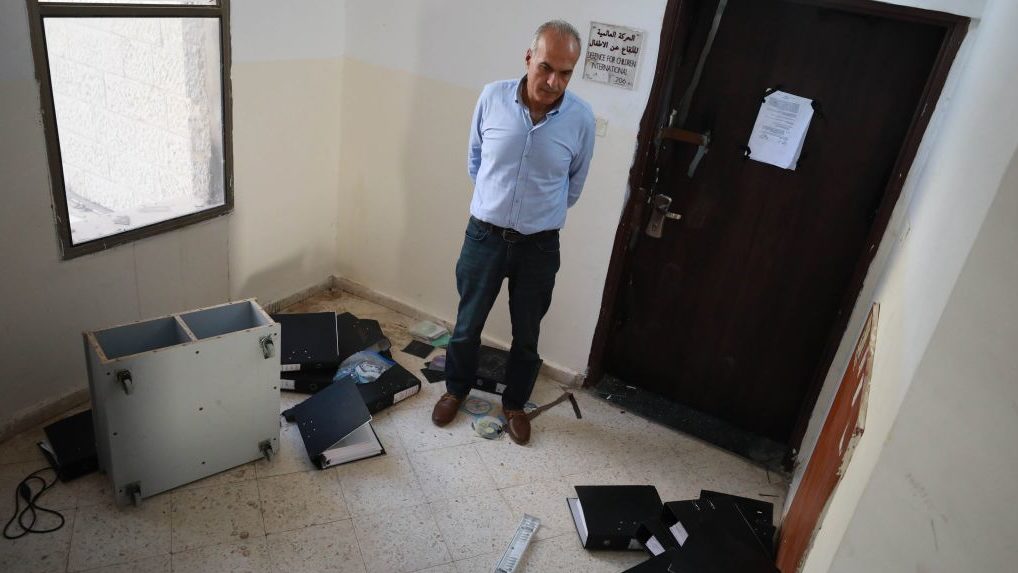Lessons for the Palestinian Leadership
An-Nahar, Lebanon, August 20
At dawn on Thursday, August 18, the Israeli military wasn’t preparing for a military raid against a terror cell, as happened in the past in cities like Jenin and Nablus. Rather, it was a raid against civil and human rights organizations in the heart of Ramallah, groups like Addameer, Al-Haq, the Bisan Research Center and the Defense for Children International – Palestine. There is absolutely no doubt that these organizations were established in accordance with Palestinian law, that is, they are licensed and legitimate organizations that operate within the Palestinian territories and even receive funding from European Union member states. Their headquarters are all located near the office of Palestinian President Mahmoud Abbas and Prime Minister Muhammad Shtayyeh. They are also just down the street from the headquarters of the Palestinian security services, which is supposed to prevent the movement of Israeli military units within the streets of Ramallah, or any other Palestinian territory. Of course, no one, with the exception of Israel, which is an occupying apartheid state, truly believes that these relief and aid organizations actually pose a serious security threat to anyone. However, the Israeli military knows that many of these groups collect facts on the ground, conduct investigations, and write reports that shed light on Israel’s violations of human rights in the occupied Palestinian territories. It’s clear that, in launching these raids, Israel is continuing its campaign aimed at subjugating the Palestinian people by weakening their civil society. Israel’s actions are also meant to send a clear message to the Palestinian Authority, according to which the Palestinians – despite having a president, a government, a flag, an anthem, embassies, and even a security force – are ultimately nothing more than pawns in Israel’s chess game. It is Israel that will ultimately exercise control over all West Bank territory. Any Israeli concessions to the Palestinians will come in the form of economic benefits. In pursuing this strategy, Israel also seeks to expose the fragility of the Palestinian Authority and undermine its role in front of its people. What is important now is that this incident, like many other Israeli incursions into the cities of Jerusalem, Jenin, Nablus, and Hebron, draws attention to an incomprehensible and unacceptable reality that must change. First, the Palestinian Authority must cease to maintain security coordination and economic relations with Israel. Since 2015, Palestinian President Mahmoud Abbas ignored the Palestinian Central Council’s decision to end security coordination with Israel. Moreover, he is not doing anything to strengthen the Palestinian situation. Today, it seems as if the Palestinian Security Services, which consume about 40% of the Palestinian Authority’s budget, have no real mission other than protecting Abbas’ rule. Second, Israel’s incursions into areas that are under the strict control of the Palestinian Authority, according to the Oslo Accords, must not be a reality that the Authority simply comes to accept. The Palestinian leadership must defend the Palestinian people and Palestinian civil society organizations from Israeli attacks within its own sovereign jurisdiction. Third, it’s clear from all of this that the Palestinian leadership continues to submit to Israeli dictates, by relinquishing its right to sovereignty. It hasn’t taken a single initiative to promote Palestinian statehood on the ground. Instead, it has fallen for the delusion that if the United Nations would recognize it as a state, all of its problems will be solved. Does the Authority think that independence will simply be handed to the Palestinian people on a silver platter? Does it truly believe it can stand idly by, treating the events unfolding around it as an observer, without taking any initiative to change the situation? – Majid Kayali (translated by Asaf Zilberfarb)
Give the gift of hope
We practice what we preach:
accurate, fearless journalism. But we can't do it alone.
- On the ground in Gaza, Syria, Israel, Egypt, Pakistan, and more
- Our program trained more than 100 journalists
- Calling out fake news and reporting real facts
- On the ground in Gaza, Syria, Israel, Egypt, Pakistan, and more
- Our program trained more than 100 journalists
- Calling out fake news and reporting real facts



